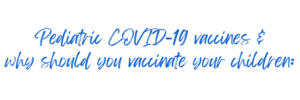

- COVID-19 vaccines available in the US are effective at protecting people from getting seriously ill, being hospitalized, and even dying – especially people who are boosted.
- People are best protected when they stay up to date with the recommended number of doses and boosters
- COVID-19 vaccines can offer added protection to people who have COVID-19, including protection against being hospitalized from a new infection
- COVID-19 vaccines are safe – much safer than getting COVID-19.

Vaccination against COVID-19 is the best way to reduce the negative impact of this pandemic in all age groups. Getting a COVID-19 vaccine is a safer, more reliable way to build protection than getting sick with COVID-19:
- Getting sick with COVID-19 can cause severe illness or death, even in children, and we can’t reliably predict who will have mild or severe illness
- You may have long-term health issues after having COVID-19. Even people who do not have symptoms when they are first infected can have these ongoing health problems, also known as long COVID or post-COVID conditions.
- While people can get some protection from having COVID-19, the level of protection varies. Immunity from infection can vary depending on how mild or severe someone’s illness was and their age
- Immunity from infection decreases over time

Just like adults, COVID-19 can make children of any age very sick and can sometimes require treatment in a hospital. Some children have even died from COVID-19. Children and teens who get COVID-19 can develop serious complications like multisystem inflammatory syndrome in children (MIS-C), a condition where different body parts become inflamed, including the heart, lungs, kidneys, brain, skin, eyes, or gastrointestinal organs. After getting COVID-19, children can also experience a wide range of new, returning, or ongoing health problems are known as long COVID or post-COVID conditions. Getting eligible children and teens vaccinated against COVID-19 can help keep them from getting really sick if they do get COVID-19. Vaccinating children can also help relieve the strain on families by providing greater confidence in children participating in childcare, school, and other activities While COVID-19 vaccines were developed quickly, all steps have been taken to ensure their safety and effectiveness. COVID-19 vaccines were developed using science that has been around for decades.
While COVID-19 vaccines were developed quickly, all steps have been taken to ensure their safety and effectiveness. COVID-19 vaccines were developed using science that has been around for decades.
- COVID-19 vaccines were developed using science that has been around for decades
-
Before COVID-19 vaccines were recommended, scientists conducted clinical trials with thousands of children and adults and found no serious safety concerns
-
Hundreds of millions of poeple in the USA have received COVID-19 vaccines under the most intensive safety monitoring program in U.S. history
-
Serious side effects that could cause long-term health problems are extremely unusual following any vaccination, including COVID-19
-
The benefits of COVID-19 vaccination outweigh the known and potential risks

The protection COVID-19 vaccines provide decreases over time, especially for certain groups of people. For this reason, CDC recommends everyone ages 6 months and older stay up to date with their vaccines, which includes everyone 5 years and older getting boosters if eligible, for the best protection against COVID-19.
People who have certain medical conditions or who are taking medications that weaken their immune system are at increased risk of severe COVID-19 illness and death. Additionally, their immune response to COVID-19 vaccination may not be as strong as in people who are not immunocompromised. People who are moderately or severely immunocompromised have specific recommendations for COVID-19 vaccines, including boosters.
-
During Omicron circulation, protection was higher for adults who received three COVID-19 mRNA vaccine doses (Pfizer/BioNTech or Moderna) or a Johnson and Johnson (Janssen) vaccine followed by an mRNA booster dose compared to those who received two Johnson and Johnson (Janssen) vaccine doses
-
A study of approximately 15,000 nursing homes found that residents who received additional primary or booster doses of COVID-19 vaccines (that is three or more doses if the primary series was mRNA vaccine) had greater protection against infection with the Omicron variant of the virus that causes COVID-19 than residents who only received two doses of an mRNA vaccine (Pfizer-BioNTech or Moderna) or one dose of a Janssen (Johnson & Johnson) vaccine.
-
When the Omicron variant became dominant, protection from getting symptomatic illness provided by the primary series (two doses) of Pfizer-BioNTech COVID-19 mRNA vaccine decreased among children (5 to 11 years of age) and even more among adolescents (12 to 15 years of age) within 2 months of the second dose. Among adolescents, vaccine effectiveness against getting a symptomatic SARS-CoV-2 infection was estimated at 71% up to 6.5 weeks after receiving a booster, compared with just 17% 2 months after receiving the second dose.

-
![]()

